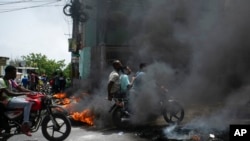China urged the U.N. Security Council on Thursday to try to cut off the supply of small arms, light weapons and ammunition to gangs in Haiti, which has been unable to stem an upsurge in criminal violence and kidnappings.
Beijing also called for the council to demand an immediate halt to gang violence, criminal activities, roadblocks and the occupation of any public institution.
It also wants the council to express its readiness to impose additional sanctions, including travel bans and asset freezes, on people who support gang violence or criminal activities, abuse human rights, or undermine Haiti's peace, stability and security.
With the mandate for the U.N. political mission in Haiti ending Friday, the 15 council members were trying to reach agreement on a new resolution to extend the mission. The resolution initially was drafted by the United States and Mexico, and China was proposing revisions supported by its ally Russia.
The revised draft, obtained Thursday by The Associated Press, includes another major proposal by China.
It asks U.N. Secretary-General Antonio Guterres to consult Haitian authorities, relevant regional countries and regional organizations "on deploying a multinational police unit" to Haiti. It would operate in close coordination with the U.N. political mission "to support the Haitian police's efforts in combating gang violence in order to establish and maintain public safety and law and order and to promote and protect human rights."
The original draft called for beefing up the U.N. mission to include up to 42 police and corrections department advisers, led by a U.N. police commissioner, and staff to ensure that sexual and gender-based violence are addressed.
When the current resolution extending the U.N. mission was adopted in October, Haiti had been contending with the assassination of President Jovenel Moise last July, a magnitude 7.2 earthquake that killed over 2,200 people in August, and escalating gang-related killings, kidnappings and turf wars.
A year after Moise's assassination, gang violence is even worse, and Haiti has gone into a free fall that has seen the economy tumble and many Haitians flee the country to escape the turmoil. At the same time, attempts to form a coalition government have faltered, and efforts to hold general elections have stalled.
This week, officials in Haiti's capital reported that dozens of people had died as a result of days of fighting between rival gangs in the violent Cite Soleil neighborhood. Doctors Without Borders said thousands of people were trapped in the district without drinking water, food and medical care.
A spokesperson for China's U.N. Mission said an embargo on weapons for criminal gangs is "the minimum" the council should do in response to the appalling situation in Haiti.
"Anything falls short of that will not only disappoint the Haitian people, but also means a lost opportunity for the Security Council," said the spokesperson, who commented only on condition of anonymity.
Other council members said an arms embargo would be unenforceable.
The draft resolution revised by China would urge "all Haitian stakeholders," including the U.N. mission and the regional organization Caribbean Community, or CARICOM, to reach an agreement within six months on a Haitian-led political effort for holding "inclusive, peaceful, free, fair, and transparent legislative and presidential elections as soon as security conditions and logistical preparations permit."
Russia supported China's call for revisions to the U.S.-Mexico draft resolution. A spokesperson for Russia's U.N. Mission said that "taking into account the situation in Haiti, we believe we need to have an opportunity to make changes to the mandate of the mission."
The United Nations has been involved in Haiti on and off since 1990, and the last U.N. peacekeeping mission was in the country from 2004 until October 2017. The political mission now there advises Haiti's government on "promoting and strengthening political stability and good governance," including the implementing the rule of law, inclusive national dialogue and protecting and protection of human rights.




